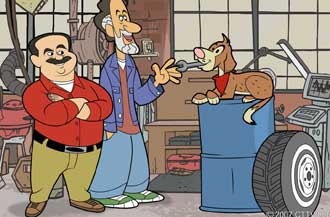


Ray and Tom Magliozzi as characterized for the new PBS animated series. (Image copyright CCTV 2007.)
More than six years after he started imagining an animated version of pubradio’s Car Talk, Howard K. Grossman has become executive producer of just such a series for PBS, in high-definition production for next summer.
PBS had been saying yes for years, but after Paula Kerger arrived as president last year, “their interest came to a whole other level,” Grossman recalls. This time, PBS said yes and put up some money.
Neither Grossman nor PBS chief programmer John Wilson will say how much the network will invest, but Wilson says it’s the predominant funder. Per hour, the animation is cheaper than drama, Wilson says. The cost is somewhere in the middle of the range for documentaries, $300,000 to $900,000 an hour, he says.
Wilson says he wants the spinoff from a longtime NPR hit to lead off primetime, probably Wednesdays, during a peak family-viewing hour “and snag a big, wide audience.”
If the show is ever syndicated after its PBS run, it “could be quite profitable” for PBS, Grossman observes. But Wilson says he’s focusing on making “a terrific first season” that will become a PBS franchise.
The series launches in a partnership with the American Association of Motor Vehicle Administrators, PBS announced July 11, but the deal is more for publicity than underwriting, Grossman says.
Starting next spring, Tom and Ray Magliozzi will be seen on posters and video monitors by millions of Americans thronging motor vehicles offices, paying tickets, posing for unflattering license photos and waiting in lines that never move. The Magliozzis will speak out for safe driving and against the scourge of drivers on cell phones.
A contest to come up with a name for the TV show will be announced on the radio show.
So far, the writing staff—Berman; Doug Mayer, head writer and producer of the radio show’s website; and veteran animation script supervisor Tim Minton—have completed half of the season’s 10 scripts.
Each episode starts with the animated Magliozzis taking a listener call in a fictional radio studio upstairs from their garage, Berman says. The call “tends to foreshadow” developments.
The story accelerates downstairs in the garage, which is stocked with new characters, such as Crusty, a mechanic and defrocked Harvard professor.
The stories may be only slightly loopier than what callers tell the brothers on Car Talk. For instance, Berman says, “There’s one where the guys invent a car that runs on pasta, but the resulting pasta shortage nearly leads to a war with Italy.”
The cartoon seems fated to share the radio show’s self-trashing humor. Asked why the project took years to develop, Berman riffs: “Well, it was an idea that had no merit. That held it up for a good five years. I guess, in that time, PBS got more and more desperate. I mean, they’ve tried good-quality, highbrow programming, and obviously that didn’t work.”
Grossman’s TV credits include Billy Joel Live from Long Island and American Playhouse’s True West. He brought in a second e.p., Robert Harris, who was president of Universal Television when it was making hits such as Murder, She Wrote and Miami Vice.
Bill Kroyer, e.p. of animation, directed the animated feature Ferngully: The Last Rainforest. And Kroyer brought in the hot character designer Steve Silver, Grossman said. Tom Sito, director of animation, worked on such features as Shrek and The Little Mermaid. Karen Johnson, producer of animation, oversaw Children’s Television Workshop’s The Wish That Changed Christmas.
Berman says the music will come from Brave Combo, a Tex-Mex polka band that he recommended.
Elissa Myers, a veteran casting director based in New York, found actors for the supporting characters.
Web page posted Sept. 28, 2009
Copyright 2007 by Current Publishing Committee